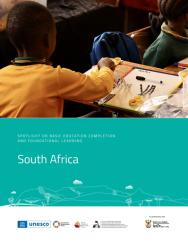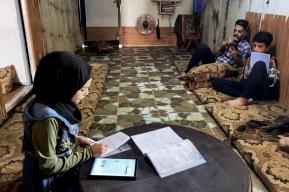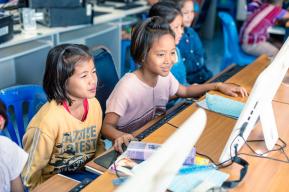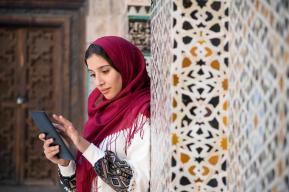Press release
South Africa Basic Education Ministry commits to improving foundational learning for all children in the country
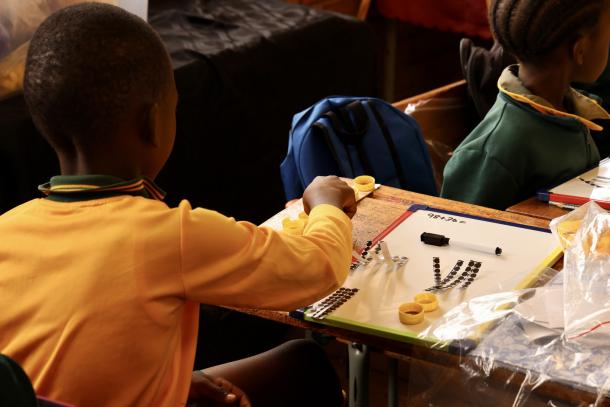
Pretoria and Paris, 14 March 2024 – The Department of Basic Education has today launched a new report providing evidence-based insights and analysis of foundational learning in South Africa. It is one of four country reports produced in partnership with UNESCO’s Global Education Monitoring (GEM) Report, the Association for the Development of Education in Africa (ADEA) and the African Union, as part of the Spotlight report series on foundational learning in Africa. Launched today at the 2024 Basic Education Sector Lekgotla, the annual education sector gathering, this report offers a diagnosis of the current state of foundational education in South Africa, with a focus on the curriculum and presenting concrete actions to improve basic skills, teacher support mechanisms and learning assessments.
The National Development Plan in South Africa calls for strong partnerships to improve learner outcomes by 2030, of which the Spotlight Report is one. Our singular aim is to ensure that no child is left behind in learning, recognising the critical importance of access to quality early learning programmes in the early ages of a child’s life. Our fruitful collaboration with the GEM Report, ADEA and the African Union has resulted in key policy solutions to remedy the challenges we face in delivering equitable, quality education for all learners, which we stand committed to pursue.
The report celebrates the achievement of universal primary completion in South Africa since the abolition of apartheid in South Africa in 1994. Grade 9 results in mathematics had shown improvement in the 15 years prior to COVID-19, although Grade 4 results in reading assessed post-COVID suggest that learning levels have been not only low but also falling.
Three positive practices have been highlighted in the Spotlight Report on South Africa. First, there is clear government commitment to build internal capacity to undertake research and evaluation through close partnerships with researchers and practitioners and use the results in policy and programming.
The other two are aiming to improve numeracy proficiency. The Teaching Mathematics for Understanding programme has been piloted in 40 schools over the past five years and demonstrates a commitment to improve the proportion of learners who meet internationally agreed upon minimum proficiency levels. Lesson plans are provided for teachers all centred around the aim of ensuring that all learners understand each mathematics concept.
The Mental Starters Assessment Project introduces six focused mathematics lesson units for Grade 3 students, targeting skills like addition, subtraction, multiplication, division, place value, fractions, and geometry. The aim of the project is to move students beyond inefficient counting methods like finger counting and tally marks, fostering a strong number sense.
The Spotlight Report reviewed the national curriculum, learner workbooks, teacher guides and mathematics assessments in grades 3 and 6. Alignment across these pedagogical inputs can help learners effectively master these skills. Currently, there is some misalignment between CAPS, the intended national curriculum, and the content of learner textbooks and national assessments, as a result of a multiyear curriculum recovery approach to address the negative impact of COVID-19, in Grade 3 and, to a lesser extent, to Grade 6.
Overall there is strong alignment between the national curriculum and global standards.
These and other findings inform the seven recommendations of the report, offering concrete actions to improve and strengthen learning in South Africa.
1. Continue to support the vision of foundational literacy and numeracy including through high-quality teaching and learning materials.
2. Consider continuing the provision of concrete maths kits and games for early grade maths classes and additional teacher training on how to use them for teaching.
3. Ensure that instructional material is delivered to schools in time for the start of term.
4. Strengthen the accessibility of materials in all official languages across all years of primary school education, not just in the Foundation Phase.
5. Plan targeted teacher support related to content areas where need is shown.
6. Prioritize assessment for monitoring student progress.
7. Continue to improve infrastructure to accommodate increases in student enrolment.
“Our research underscores the critical importance of addressing the gaps between educational policy and classroom implementation. By identifying these challenges and offering actionable recommendations, we aim to empower South African policymakers and educators to create inclusive and effective learning environments for all students”, said Manos Antoninis, the Director of the Global Education Monitoring Report.

